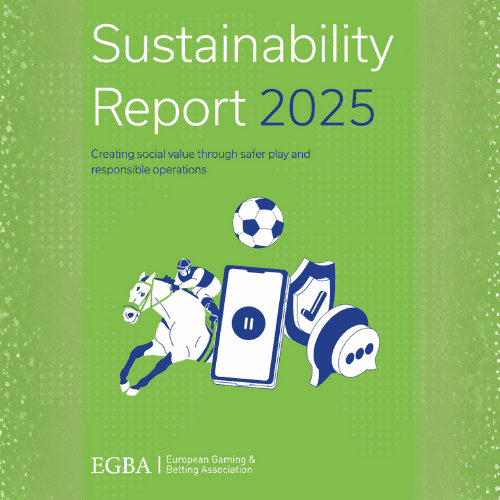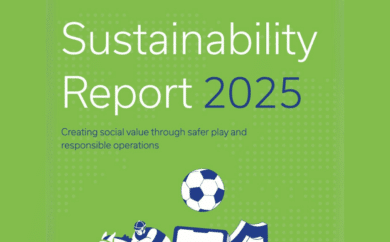The newly released European Gambling and Betting Association (EGBA) Report demonstrates how the gambling industry in Europe is evolving toward safer play and enhanced social responsibility. From record tax contributions to more players setting limits on their betting, the industry is beginning to show real change. For the UK, these insights give a clear picture of where the sector is heading and what still needs to be done.

Growing Focus on Safer Gambling
One of the most important findings in the report is the increased use of safety tools. Over 26 million players activated at least one tool, such as deposit limits, reality checks, or self-exclusion. More than 13 million chose to use these tools voluntarily. This indicates that safer gambling is becoming an integral part of normal play, rather than just a regulatory requirement.
Tools are important, but their impact matters even more. The report shows that 42% to 46% of high-risk players improved or stabilised their behaviour after receiving personalised messages. These interventions, delivered through pop-ups, emails, or even direct calls, gave players the chance to reflect and take control.
For many, it led to setting new limits or reducing deposits. This is evidence that responsible gambling strategies are moving beyond box-ticking. They are starting to influence real behaviour, which is essential if the industry is to maintain public trust.
Contributions to Society
The financial contributions of the industry also grew in 2024. EGBA members paid €3.8 billion in taxes, marking the first time this figure has been reported collectively. These contributions support public services, infrastructure, and social programs.
The industry also supports over 62,000 jobs across Europe, spanning roles ranging from technology to customer service. For many towns and cities, operators are important local employers. Beyond jobs and taxes, members invested €735 million in sport and donated €156.8 million to charities. These funds support grassroots clubs, professional competitions, local projects, and programs to prevent gambling harm.
Environmental Responsibility
Sustainability today goes beyond financial and social measures. Environmental impact is also becoming part of the picture. EGBA members reduced their overall energy use by 11% in 2024 and increased the share of renewable energy to 78%.
At the same time, greenhouse gas emissions rose, mostly due to expanded reporting of supply chain activities. This shows both the complexity and the importance of addressing environmental responsibilities. For operators, progress on climate and energy use is now as much about meeting future regulatory expectations as it is about reputation.
Training People to Make a Difference
Behind every safety tool or intervention is a person making decisions. That is why training staff has become such a priority. In 2024, 89% of employees across EGBA members received dedicated training on safer gambling.
This is more than just customer service scripts. It means thousands of employees, including those in back-office and technical roles, now understand the signs of harmful play and know how to respond.
The more widespread this knowledge becomes, the better it shapes company culture. Safer gambling is no longer the responsibility of a single department. It is becoming a shared responsibility across the entire workforce.
Member Initiatives from Individual Operators
The report also includes examples of what member companies are doing independently. These stories show how sustainability is being embedded in different ways:
- Bet365 continues to develop early risk detection systems to spot harmful play and intervene quickly.
- Entain piloted financial risk checks in collaboration with credit agencies, helping to shape the debate about affordability and player safety.
- Flutter introduced responsible gambling messages into all its marketing campaigns in the UK and Ireland, which boosted the use of safety tools among customers.
- LeoVegas supported wildlife conservation by rescuing lions from captivity and funding their care in South Africa, while also investing in local community projects across Europe.
- Superbet expanded its foundation work, including major investments in chess and inclusive sports programs.
These examples underline that sustainability is not only about compliance. It is about finding ways to add positive value to society and local communities.
Addressing Risks from Unregulated Operators
The positive progress does not mean the industry is free from challenges. One of the biggest threats highlighted in the report is the growth of unregulated gambling. Where restrictions are too heavy or poorly designed, players often turn to offshore websites. These sites offer none of the safeguards that regulated operators provide.
The Netherlands saw this play out dramatically after new spending caps were introduced in 2024, leading to a sharp increase in black market activity. Within months, some unregulated operators had gained a market share equal to that of regulated firms.
The UK faces a similar risk. Estimates suggest that £2.7 billion is staked annually on black market websites, costing taxpayers £335 million in lost taxes.
This leads to two major issues. Players are left unprotected without safety tools or interventions, and governments lose tax revenue that could support essential services. The report calls for smarter regulation that keeps players in safe environments rather than pushing them away.
Real Changes and Next Steps
The EGBA report makes one point clear: responsible gambling is more than a slogan. It comes from practical steps, smart investments, and helping both regular and high-risk players. These changes are moving the UK betting sector forward quickly, making betting safer and more positive for everyone involved.
As these programmes and support grow, the goal is to reduce gambling harm and build healthier communities. With strong support for sports, big donations to good causes, and real care for player and environmental safety, the future of gambling in the UK looks brighter. The sector’s long-term success depends on sustaining these changes and ensuring they deliver the best results for everyone.




